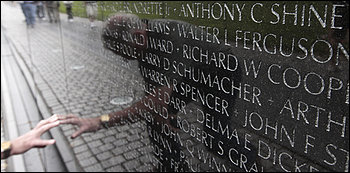Why would anyone need to lie about having been in Vietnam?

By Henry Allen - The Washington Post
Thursday, May 20, 2010
O,the stained souls, the small-hours doubts, the troubled manhood of so many American men who didn't go to Vietnam when they could have -- the strange guilt they seem to feel when they confront Vietnam veterans.
Strange: There were some cheaters and liars, but all that most of them did was exercise their legal rights, in the manner of Richard Blumenthal, Connecticut attorney general and Democratic Senate candidate -- five deferments, then a safe stateside slot in the Marine reserves.
They had a right to avoid the draft with academic deferments, occupational deferments and medical deferments obtained from doctors noted for their artistry in taking X-rays of dangerous deformities.
They were entitled to get married and sire a child that could bring them a 3-A hardship deferment. Couldn't these men argue that they had a moral obligation not to fight in an immoral, pointless war? Wasn't it true that "winners go to Harvard, losers go to Vietnam," as the wisecrack had it?
The case can be made that these men -- often upscale and educated, the sort of people who are supposed to lead this country -- acted legally and even honorably in using their social status and intelligence to stay out of Vietnam.
But the stains and doubts linger.
Vietnam veterans who don't care whether somebody served have had to sit through plaintive confessions.
"I got a high number in the draft lottery," the non-servers say in a tone of remorse.
"You lucked out," veterans say, but the lucky ones are not consoled.
To prove they couldn't have gone even if they'd wanted to, men have been known to pull up their shirts to show the scars from youthful back surgery. "They fused all those vertebrae."
So many confessions. Pathetic. It was 40 years ago. Forget about it.
"I was going into officer training but then I got a full scholarship to Oxford."
"Good for you," the veterans say. But the scholars are not consoled.
Of course, Blumenthal didn't get in trouble for confessing he had ducked Vietnam but for lying that he hadn't, for saying that he'd served there.
What demon haunts him and others like him? What inconsolable regret provoked these desperate lies?
He didn't have to claim he'd been in Vietnam. He already had the résumé to be a shoo-in candidate. Rich kid, Harvard (editor of the Crimson), reporter at The Washington Post, Yale Law School (editor of the law journal), almost two decades as attorney general, the perfect knowledge-class candidate of the kind favored by modern Democrats. (In looks, however, he does bear an unsettling resemblance to disgraced former New York governor Eliot Spitzer.)
Bill Clinton not only dodged the draft but lied to do it, and still we elected him president over a World War II combat flier -- though Clinton never lied about having been in Vietnam. George W. Bush spent his war flying fighters over Texas and still defeated Al Gore, who had served in Vietnam. Then Bush beat John Kerry, a wounded and be-medaled Vietnam veteran. Dick Cheney's military record -- he got five academic deferments -- didn't seem to hurt his political career, and he was bold enough to say to a Washington Post reporter: "I had other priorities in the '60s than military service."
Of course none of them lied about having been in Vietnam -- a catastrophically stupid thing to do, a fact that is easily checked. What would propel Blumenthal to do such a thing?
As a Marine (and Vietnam veteran of no distinction whatsoever), I've run into men who told me they'd been in the Marines, too. Always happy to meet a fellow Marine, I'd ask what unit they served in.
"Oh, I was in . . . the 173rd . . ." Except there is no 173rd in the Marine Corps. I've felt embarrassed for them and wondered how empty their lives were that they'd tell such a lie. Jim Lehrer, PBS anchorman and former Marine, wrote a pungent little novel, "The Phony Marine," about this quirk in the male ego.
Once I listened to a former war-zone correspondent who was eager to demonstrate that his time under fire was the same as a soldier's. He said: I'd get up in the morning and face the decision of whether I should head out where it was really dangerous.
But soldiers don't get to decide. They don't have choices. That's part of the hell of war.
The fact is that regardless of whether a war was moral, justified, won or meaningful, having served in one -- particularly in combat -- confers prestige. Harvard and Yale and social connections are nice, but at 3 o'clock in the morning you find yourself outranked by high school dropouts whose names are on the wall of the Vietnam Memorial. Not in the eyes of the world, but in your own eyes.
What a withering stare it must be for some men, that they'll shame themselves far worse than they were shamed before, by telling a lie.
Henry Allen, who won the Pulitzer Prize for criticism in 2000, was a Post editor and reporter for 39 years.